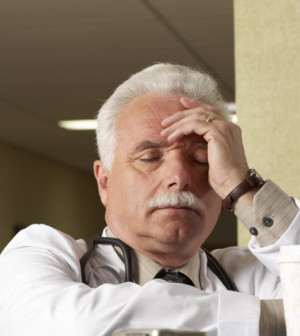- Fragments of Bird Flu Virus Found in U.S. Milk Supply
- There’s an ‘Epidemic’ of Loneliness Among U.S. Parents, Poll Finds
- Infertility Is Rising Among Young Married Women
- New Rules Mean 3.6 Million Americans Could Get Wegovy Via Medicare, Costing Billions
- ‘Dream It, Be It?’ Study Finds Teens Who Focus on Life Goals Often Succeed
- Trying ‘Magic Mushroom’ Drug to Ease Depression? It Has Side Effects
- $282 Billion: What Mental Illness Costs America Each Year
- Black, Hispanic Americans Getting Savvier About CPR
- Kids With Common Skin Conditions Face Stigma, Bullying
- Science Reveals How Aspirin Prevents Colon Cancer
Risk of Depression May Rise With Too Much or Too Little Sleep


Too much or too little sleep can increase the risk of depression, according to two new studies.
Inappropriate amounts of sleep may activate depression-related genes, researchers report in the Feb. 1 issue of the journal Sleep.
One study included more than 1,700 adult twins. Among those who got normal amounts of sleep (seven to nearly nine hours a night), the genetic influence on symptoms of depression was 27 percent versus 53 percent for those who slept only five hours a night, and 49 percent among those who slept 10 hours a night.
“Both short and excessively long sleep durations appear to activate genes related to depressive symptoms,” lead investigator Dr. Nathaniel Watson, an associate professor of neurology and co-director of the University of Washington Medicine Sleep Center in Seattle, said in a journal news release.
Ensuring that patients get optimum levels of sleep may be one way to boost the effectiveness of treatments for depression, he added.
The second study included more than 4,100 youngsters aged 11 to 17. It found that sleeping six hours or less per night increased their risk for major depression, which in turn increased their risk for too little sleep.
“These results are important because they suggest that sleep deprivation may be a precursor for major depression in adolescents, occurring before other symptoms of major depression and additional mood disorders,” principal investigator Dr. Robert Roberts, professor of behavioral sciences in the School of Public Health at the University of Texas Health Science Center in Houston, said in the news release.
“Questions on sleep disturbance and hours of sleep should be part of the medical history of adolescents to ascertain risk,” he added.
“Healthy sleep is a necessity for physical, mental and emotional well-being,” Dr. M. Safwan Badr, president of the American Academy of Sleep Medicine, said in the news release. “This new research emphasizes that we can make an investment in our health by prioritizing sleep.”
More information
The U.S. National Institute of Neurological Disorders and Stroke has more about sleep.
Source: HealthDay
Copyright © 2024 HealthDay. All rights reserved.










